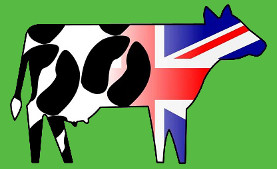By Fisher, A. D. and Matthews, L. R. and Morrow, C. J. and Verkerk, G. A., Livestock Production Science, 2002
Research Paper Web Link / URL:
http://www.sciencedirect.com/science/article/pii/S0301622601002469
http://www.sciencedirect.com/science/article/pii/S0301622601002469
Description
In order to examine the effects of moderate feed restriction and periodic lying deprivation on pituitary–adrenal axis function in lactating dairy cows, 32 non-pregnant Jersey cows were allocated to two levels of feeding (4% vs. 3% of body weight of dry matter daily) and lying restriction (free lying vs. prevention of lying from 15:00 to 06:45 h daily) in a 2×2 factorial plan for 7 days. There were no feeding×lying interactions, and feeding level did not affect plasma cortisol concentrations, adrenocorticotrophic hormone (ACTH) and cortisol responses to challenge with 15 μg corticotrophin-releasing hormone (CRH), or ACTH and cortisol responses to CRH following the administration of 0.3 mg dexamethasone. Compared with free-lying animals, lying-restricted cows had increased basal plasma cortisol concentrations, and reduced ACTH and cortisol responses following CRH challenge relative to pre-challenge baselines. Lying-restricted cows also had an increased plasma cortisol/ACTH ratio for the total area under the hormone response curves following CRH. Dexamethasone administration prior to CRH challenge produced a similar result to CRH challenge alone, indicating that there were no differences between lying-restricted and free-lying cows in negative feedback sensitivity of the pituitary to glucocorticoids. In conclusion, 7 days of moderate feed restriction did not appear to alter pituitary–adrenal axis function, whereas periodic lying deprivation reduced pituitary responsiveness to CRH and increased plasma cortisol/ACTH ratio following CRH challenge.
In order to examine the effects of moderate feed restriction and periodic lying deprivation on pituitary–adrenal axis function in lactating dairy cows, 32 non-pregnant Jersey cows were allocated to two levels of feeding (4% vs. 3% of body weight of dry matter daily) and lying restriction (free lying vs. prevention of lying from 15:00 to 06:45 h daily) in a 2×2 factorial plan for 7 days. There were no feeding×lying interactions, and feeding level did not affect plasma cortisol concentrations, adrenocorticotrophic hormone (ACTH) and cortisol responses to challenge with 15 μg corticotrophin-releasing hormone (CRH), or ACTH and cortisol responses to CRH following the administration of 0.3 mg dexamethasone. Compared with free-lying animals, lying-restricted cows had increased basal plasma cortisol concentrations, and reduced ACTH and cortisol responses following CRH challenge relative to pre-challenge baselines. Lying-restricted cows also had an increased plasma cortisol/ACTH ratio for the total area under the hormone response curves following CRH. Dexamethasone administration prior to CRH challenge produced a similar result to CRH challenge alone, indicating that there were no differences between lying-restricted and free-lying cows in negative feedback sensitivity of the pituitary to glucocorticoids. In conclusion, 7 days of moderate feed restriction did not appear to alter pituitary–adrenal axis function, whereas periodic lying deprivation reduced pituitary responsiveness to CRH and increased plasma cortisol/ACTH ratio following CRH challenge.
We welcome and encourage discussion of our linked research papers. Registered users can post their comments here. New users' comments are moderated, so please allow a while for them to be published.
